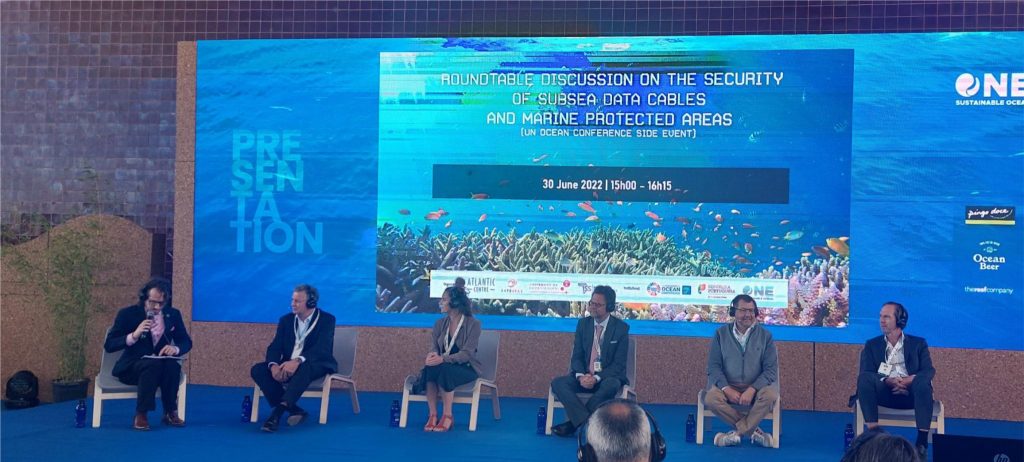Undersea cables are the lifeline of the contemporary global economy. Up to 95% of all data transmissions depends on the cables. This includes financial transactions, emails, cloud storage or video conferencing. Also subsea electricity cables are becoming more important to connect the green economy. Yet, this crucial infrastructure is hardly visible in public debates. How the global system is governed and protected is often opaque. Cable protection sits at the intersection of maritime security, cyber security and critical infrastructure protection.
Since 2019 SafeSeas has identified the undersea cable system as a key topic and aims to increase awareness for the strategic importance of cables and their protection. We also facilitates research on the risks, dependencies, governance and protection of the cable system.

A global series of event
In 2020 SafeSeas partnered with the Institute of Security Studies (Pretoria) and the University of Copenhagen to organize a global series of events funded by a grant by the Danish Agency for Higher Education and Science.
To open the discussion, we kicked off with two webinars debating with industry and experts the need for improving cable resilience (the recordings are available here and here).
In June 2022 we held a workshop in the framework of the UN Ocean Conference with a focus on Europe and the Atlantic. The event held in Lisbon was co-sponsored by the Atlantic Center of the Portuguese Ministry of Defense. The event investigated the role of different agencies in cable protection, drawing on insights from a study for the European Parliament. Speakers represented the industry, agencies, such as the European Maritime Safety Agency, or the European Defense Agency as well as national authorities. The event also included a site visit to the Ella Link landing station. We also held a public roundtable which was an official side event of the UN conference. The full event documentation is available here (summary).
In September 2022 we held an event with a focus on African challenges and capacity building. The expert workshop was organized in cooperation with the Atlantic Center, University of Cape Town, the EU’s Cyber for Development Initiative and Cardiff University. The event featured speakers from the African industry, regional organizations such as NEPAD, UNIDIR, or the Indian Ocean Commission, as well as from South Africa, Botswana and Mozambique. Two of the key themes of the discussion were: 1) the digital dependency of Southern Africa implied by the lack of data centers as well as the weakness of intra-African connections; 2) the relationships and mutual responsibilities between states, local and global industry in building, maintaining and repairing digital infrastructures. Part of the event was an excursion to the cable repair ship that covers the East and West coast of Southern Africa, sponsored by Orange Maritime.
Since 2023 we address subsea data cables in our broader research on Critical Maritime Infrastructure Protection. This acknowledges that data cables are increasingly closely integrated in a set of other maritime infrastructures, such as pipelines or electricity cables.

Research activities and outputs
Since March 2022 our research work in this area benefits from a grant by the Velux Foundation as part of the Ocean Infrastructures Research Group (OCINFRA) at the University of Copenhagen.
Find out more in our articles and outputs:
- Security threats to undersea communications cables and infrastructure – consequences for the EU, In-Depth Analysis for the European Parliament commissioned by the Sub-Committee on Security and Defense, 1.6.2022, investigates the threats and vulnerabilities for the European Union, current protection regimes, and lays out 37 recommendations for how to improve cable resilience.
- Ukraine war: Kremlin’s threat to interfere with undersea data cables may be bluster, but must be taken seriously, The Conversation, 20.6.2023,
- Can Europe protect its underwater cables from sabotage? EU Observer, 11.10.2022,
- Nord Stream sabotage: the dangers of ignoring subsea politics, The Loop, 7.10.2022.
- Nord Stream pipeline sabotage: how an attack could have been carried out and why Europe was defenceless, The Conversation, 5.10.2022,
- Protecting subsea data cables in Europe and the Atlantic – Challenges of a new era, Atlantic Center Working Paper, 13.7.2022.
- Maritime Security in the Atlantic: the Vulnerabilities of Subsea Data Infrastructure, IDN E-Briefing Papers, May 2022, discusses the vulnerabilities in the Atlantic region and how cables might enable cooperation.
- Beyond Triple Invisibility: Do Submarine Data Cables Require Better Security? Global Observatory, 15.9.2021, argues that more attention is required for the strategic significance of cables.
- Undersea, out of Mind. Sea Control Podcast, Episode 251, 2021, a podcast discussing the state of the art on cable resilience.
- Undersea cables: the Western Indian Ocean’s governance and security lifeline, Webinar recording, hosted by the Institute for Security Studies. A discussion of what is at stake in the Western Indian Ocean.
- Securing the Subsea Data Cable Network: Time to rethink? Webinar recording, hosted by SafeSeas. Provides a broad overview of the different issues at stake in cable protection.
- Governing hidden infrastructure: The security politics of the global submarine data cable network, Contemporary Security Policy, 2021, major journal article that discusses the state of the art on cable protection and investigates why and how cables have recently become a security problem.
